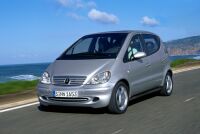DaimlerChrysler‘s innovative application of abaca plant fiber in underfloor protection for passenger cars has been recognized with an award to be presented on April 5, 2005 in Paris. This company, along with the supplier specialists Rieter Automotive and Manila Cordage, is to receive the award from the European composite materials association “JEC Group” in the category “Ground Mass Transportation”. DaimlerChrysler has already been successfully using natural fibers such as flax, hemp, sisal and coconut for several years in vehicle interiors; now for the first time, a natural fiber component is being used on the exterior of a passenger car as a covering for the spare wheel recess.
The new combination of PP thermoplast with embedded banana fiber was patented by DaimlerChrysler’s researchers, and the manufacturing process has been initiated by Rieter Automotive. Manila Cordage, a manufacturer of semi-finished products from the Philippines, supplies the fibers of the banana variety “Musa textilis”, commonly known as “abaca”. These fibers are 1.5 to 2.7 meters (4 ft 11 in to 8 ft 10 in) in length, have a high tensile strength and are resistant to rotting; for this reason, they are traditionally used for making ropes. Abaca is the first natural fiber to meet the stringent quality requirements for components used on the exterior of road vehicles, especially resistance to influences such as stone strike, exposure to the elements and dampness.
Prof. Herbert Kohler, Head of the Vehicle Body and Drive Systems Directorate and DaimlerChrysler Environmental Officer, commented on this natural fiber innovation: “With more than 15 years’ experience in research, we are now the only automotive manufacturer to use the high-performance abaca fiber on the exterior of a vehicle.”
“In close cooperation with DaimlerChrysler and Manila Cordage, we have impressively demonstrated our capacity for development,” said Gerard Seuvre, Head of Research & Technology at Rieter Automotive Management AG, at the award presentation. He added: “In view of time considerations, the required expertise, and the distance to the raw materials suppliers in the Philippines, the success of this project was by no means a foregone conclusion.”
Natural fibers can save costs and weight, help protect valuable natural resources, and are a regenerative raw material. Production of the glass fiber used hitherto consumes a great deal of energy; the use of abaca fiber can bring about primary energy savings of 60% or more. In cooperation with DaimlerChrysler’s researchers, who are highly experienced in dealing with natural fibers, the supplier Rieter Automotive has mastered the challenges of modifying the natural fiber manufacturing process, retaining the length of the abaca fibers and at the same time distributing them evenly throughout the polypropylene (PP) matrix.
 Once the component passed all DaimlerChrysler’s functional tests, it was introduced in the Mercedes-Benz A-Class coupe on production start-up in September 2004.
Once the component passed all DaimlerChrysler’s functional tests, it was introduced in the Mercedes-Benz A-Class coupe on production start-up in September 2004.
In addition:
The yearly JEC Awards rewards the most innovative composite solutions – processes, products and applications using composite materials. This year one of the six prize-winners is a natural fibre reinforced composite. The JEC Composites Show in Paris is the biggest and most important composites event in the world.
Category: Ground Transport
PP thermoplastic reinforced
Competing company: Rieter (CH) – An adaptation of the LFT-ILC process to accommodate abaca natural fibre. First industrial part: exterior panel for the Mercedes A-Class.
Partnership network: DaimlerChrysler AG initiated the project (concept and product), carried out the initial feasibility studies to investigate the use of abaca fibre and coordinated the programme. Manila Cordage Co (Philippines) produced natural fibres according to project requirements.
Name of the product or process: PP thermoplastic reinforced with abaca natural fibre. Process and application.
Description: the natural fibre is used as a replacement for glass fibre, while offering similar or higher characteristics.
Advantages or salient features: the challenge was to adapt the LFT (long fibre) process for natural fibres while maintaining fibre length and correct distribution of fibre in the matrix. A highly competitive solution.
The companies involved focused on a sustainable development approach, using renewable resources to lower carbon dioxide emissions. Another factor intervened with the catastrophic deforestation that has taken place in the Philippines, producing landslides. Growing abaca there could alleviate the problem and provide a source of additional income for the population as well.
State of development: high-volume production for the A-Class car has started.
Reason selected for shortlist: we quite appreciated the fact that the project gives both sustainable development and technological demands their due.
(Vgl. Meldung vom 2004-11-20.)
Source
Daimler-Chrysler-Press release, April 05 and JEC - Composites, No. 16, April 05.
Share
Renewable Carbon News – Daily Newsletter
Subscribe to our daily email newsletter – the world's leading newsletter on renewable materials and chemicals









